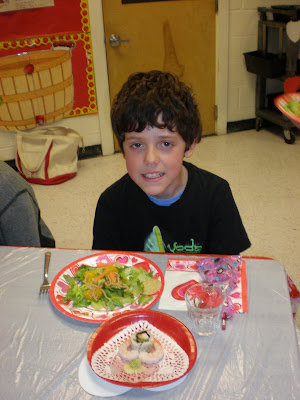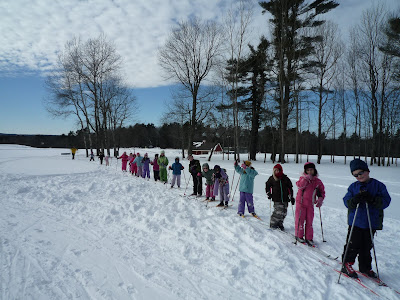

Monday, February 28, 2011
Friday, February 18, 2011
Two languages make your brain buff
 Elizabeth Landau - CNN.com - Health Writer/Producer - 02/18/11
Elizabeth Landau - CNN.com - Health Writer/Producer - 02/18/11If you had any doubts about exposing your child - or yourself - to a foreign language, there's more evidence than ever that being bilingual has enormous benefits for your brain.
Scientists presented their research supporting this idea Friday at the American Association for the Advancement of Science annual meeting in Washington, D.C.
As the human body begins its natural decline in old age, bilinguals seem to maintain better cognitive function, said Ellen Bialystok of York University in Toronto, Ontario. This is the case even for people with dementia. Bialystok and colleagues have studied many Alzheimer's patients, both monolinguals and bilinguals. They found that bilinguals were on average four to five years older than monolinguals at comparable points of neurological impairment.
Once Alzheimer's disease begins to compromise the brain, it appears that bilinguals can continue to function even though there’s damaged tissue, she said.
So what's going on? One theory is that language learning is an example of "cognitive reserve." It something that keeps the mind active in the same way as puzzles and games do, and works toward compensating for the build-up of dementia-causing pathology in the brain, Bialystok said.
In terms of starting language learning in middle or old age, the likelihood of becoming truly fluent in a new tongue is low, but it seems that every little bit helps in preventing cognitive decline, she said. And proficiency may be more important than age of acquisition, said Judith Kroll, researcher at Pennsylvania State University, before the conference.
Bilinguals are also better than monolinguals at multitasking, Kroll said. Juggling their languages helps bilinguals ignore irrelevant information and prioritize tasks better than those who only can only speak on tongue, she has found in her research. That makes sense considering that when a bilingual person speaks one language, the other language is still potentially active. That means that speakers of two languages are constantly inhibiting one language in favor of another, which perhaps enhances their overall attentional skills.
Why is it so hard for adults to learn a new language, compared with kids? The answer might not lie entirely in the brain. The social, educational, and other circumstantial conditions are different when an adult gets exposure to language, Bialystok said. As a child, learning a language is pretty much all you do. Adults can't devote as much time or attention to the experience of picking up a new tongue.
"It’s a change we can deal with as adults if there’s sufficient time and opportunity," she said.
Are there any downsides to being bilingual? Babies exposed to two languages throughout pregnancy, or who hear two languages in their first days of life, don’t confuse their languages, said Janet Weker of the University of California, Santa Barbara. The scientific evidence suggests bilingual and monolingual kids have similar language development milestones; it appears that children learning two languages do not experience delays in this regard generally.
There is, however, some research suggesting that the competition that’s produced by this mental juggling may introduce a delay in processing. But it’s so small that it’s not something that would be noticeable consciously, Kroll said. It appears that the benefits of being bilingual outweigh the costs.
Sugarloaf Outdoor Experience Program










La Saint Valentin chez les petits
Wednesday, February 16, 2011
Welcome Charlène & Julie!



They are both studying Education at the University of Dijon, France. During their second year of Master, their study is comprised of several four week internships, one of them at L'Ecole Française du Maine!
They are both living in host families from the school. During the week, they go into the classrooms and work with the children of grades 2-3-4 for Julie, and preschool for Charlene.
We will be welcoming two other students form Dijon in their first year of Master from April 25 to May 20. If you would like to be a host family, please contact us at info@efdm.org.
Tuesday, February 15, 2011
Monday, February 14, 2011
Freeport Fields and Trails Project

FREEPORT FIELDS and TRAILS PROJECT
A proposed field and trails project on Hunter Road
serving the greater Freeport community
that features multi-use athletic fields and trails and supports
more than 15 outdoor recreational activities --
It will benefit the kids of the future, the RSU athletic programs,
local merchants and businesses, and our entire community
Learn more about it Tuesday, February 15, 7 – 8:30pm Freeport Community Center, 53 Depot Street
*
This unique plan combines 37 acres of new land to 260 acres of town owned land, including Hedgehog Mountain , Pownal Road Athletic Fields and the Seacoast United Athletic Field Development. The Freeport Field and Trails project will provide 4 new athletic fields suitable for soccer, field hockey, lacrosse or rugby, 3 new ball fields for little league baseball and softball, 10 – 20 kilometers of hiking/biking/Nordic trails once connected to the Hedgehog Mountain trail system, 1 sledding hill, and a recreational lodge. Freeport residents of all ages will have the outdoor recreational facility we have long desired.
Freeport Fields and Trails will also serve to alleviate some of the overcrowding, overuse and overlapping of our Middle School and High School fields while providing trails for the RSU’s cross country running and Nordic teams.
The Freeport Fields and Trails is a vital investment in our community. It will provide healthy alternatives for our children and their families while preserving open space. Additionally, it will have the added benefit of serving the customers and patrons of Freeport’s merchants, hotels and restaurants. The Fields and Trails will add to Freeport’s tourism base with athletic tournaments and events and the extensive trail systems will complete Freeport's reputation as an outdoor destination as well as a shopping destination.
CONTACT:
Sande Updegraph, Freeport Economic Development Corporation
865-4743, x 117, fedc@freeportmaine.com
Friday, February 11, 2011
Wednesday, February 9, 2011
Tuesday, February 8, 2011
Mon pays ce n’est pas un pays, c'est l'hiver






Mon pays ce n’est pas un pays, c'est l'hiver
These are the first few words of one of Quebec’s best-loved songs by chansonnier Gilles Vigneault. “My country is not a country, it’s the winter”- but it sounds much more poetic in French and for Quebeckers these words really evoke the sense of isolation created by Quebec’s fierce winter storms. They also evoke the different ways in which l’hiver has shaped our psyche – and in some circles l’hiver is even a metaphor for our sense of distinctiveness from the rest of Canada. So in Quebec, winter is more than a word – it’s a notion that’s at once seasonal and political!
Monday, February 7, 2011
Les contes de la forêt vierge





Their task was to read the story, write a shorter version of it and illustrate it through a 3-dimensional artwork. They used felt, fabric, sticks, and feathers to represent the hero/heroes of their tale. They each presented their work to the class and they then had the choice to read one story they were curious to discover after having seen the presentation.
They did a great job. The presentations are in the classroom so feel free to come take a look!



























